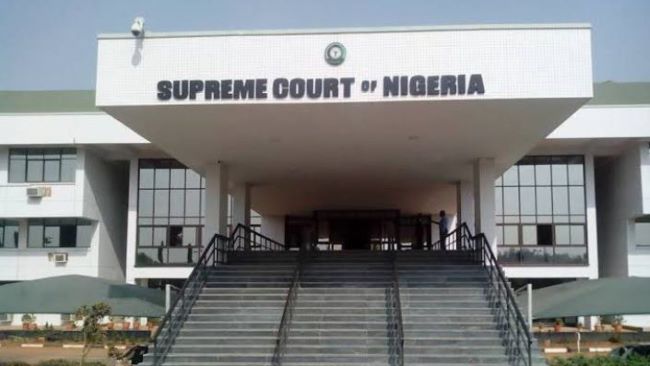It faulted the claim by the plaintiffs that the EFCC Act, being a product of the United Nations convention on corruption, ought to be ratified by majority of the state’s houses of assembly.
The plaintiffs had, in their suit, argued that the Supreme Court, in Dr Joseph Nwobike Vs Federal Republic of Nigeria, had held that it was a UN Convention against corruption that was reduced into the EFCC Establishment Act and that in enacting this law in 2004, the provision of Section 12 of the 1999 Constitution, as amended, was not followed.
They argued that, in bringing a convention into the Nigerian law, the provision of Section 12 must be complied with.
According to them, the provisions of the constitution necessitated the majority of the states’ Houses of Assembly agreeing to bringing the convention in before passing the EFCC Act and others, which was allegedly never done.
While delivering judgement on Friday, Justice Abba-Aji ruled that “the EFCC Act, which was not established from a treaty but a convention, does not need the ratification of the houses of assembly.”
“Let me first look at the constitutional provision. The plaintiffs rely on Section 12 of the constitution in their argument. Treaty is an agreement reached by two or more countries which has to be ratified.
“Conventions are agreed by a larger number of nations. Conventions only come into force when a larger number of countries had agreed.
“Therefore, the EFCC Act, which is not a treaty but a convention does not need the ratification of the houses of assembly.
“A convention would have been ratified by members state and the National Assembly can make laws from it, which will be binding on all the states in Nigeria as it is the case of EFCC Establishment Act,” the judge said.
The apex court, therefore, dismissed, the suit in its entirety and resolved the case against the plaintiffs.
“In a country like Nigeria, the federating units do not have absolute power. The NFIU guideline is to present a benchmark and not to control the funds.
“Where an Act of law is made by the National Assembly like the NFIU and its guideline, it is binding on all.
“Any act that has been competently enacted by the National Assembly cannot be said to be inconsistent,” she said.
The judge held that where the National Assembly had enecated several laws on corruption, money laundering, etc, no state had the right to make law to compete with it.
“The investigative power of the EFCC cannot be said to be in conflict with legislative powers of the state’s houses of assembly.
“I must agree with the honourable AGF that the plaintiffs’ argument, that is, the houses of assembly of the plaintiffs states, is not tenable in law,” she added.
Abba-Aji ruled that the NFIU guideline had not contravened the provision of the constitution in the management of the state’s funds and resolved the issues against the plaintiffs.
All other judges agreed with the lead judgment, saying all the issues raised in the states’ suit had no merit “and are accordingly dismissed.”
Justice Abba-Aji had earlier dismissed all objections of the Federal Government to the suit filed by the states.
Justice Abba-Aji said the plaintiffs’ case was against the AGF and not any of the agencies mentioned, hence, the Supreme Court had jurisdiction to determine it.
“Since the AGF is assumed to be the chief law officer of the federation, he is by all means the proper and necessary party in the suit..
“The AGF has locus standi to institute action against any one and the AGF can be sued in any civil matter against the government.”
The judge held that it was clear that the Federal Government had legal tussle with the states based on the directive of the NFIU which the states were contending.
“Therefore, the preliminary objection is hereby dismissed,” he ruled.
Reacting, the Counsel to Kogi Attorney-General, Abdulwahab Mohammed, SAN, said, “This is an issue we have raised before the Federal High Court, it was not addressed.
“We raised it at the Appeal Court and was not addressed. This is going to enrich our jurisprudence. We thank your lordship for hearing us out.”
Representative of the AGF, Rotimi Oyedepo, SAN, said:”we convey our gratitude to the court for your wisdom.
“Your lordship has permanently settled the legality of the anti-corruption agency in fighting corruption.”
 ‘EFCC Has Come to Stay’
‘EFCC Has Come to Stay’
Channels reports that while the controversy on the legality of EFFC went on, human rights lawyer Femi Falana faulted the move by some states and believes measures to ensure the commission is not under the control of the government should be mapped out.
“For me, the ICPC and the EFCC like the Code of Conduct Tribunal have come to stay. What we should be demanding are measures to make these institutions autonomous, not under the control of any government,” Falana said on Channels Television’s Politics Today on October 20.
“And the Supreme Court has maintained rather repeatedly concerning the EFCC and EFCC; that these are common, they shouldn’t be under the control of the Federal Government.
“They are common agencies to fight economic crimes in our country, to fight financial crimes in our country, to fight corruption in our country.”
‘Unconstitutionally established’
Earlier, a Senior Advocate of Nigeria (SAN) Olisa Agbakoba had written to the National Assembly and argued that the EFCC was “unconstitutionally established”.
“I will go further to say that I very strongly believe the EFCC is unconstitutionally established. The powers under which it was established go beyond the powers of the National Assembly. The EFCC is an unlawful organization,” the renowned lawyer wrote in separate letters to the Senate and the House of Representatives.
“I am very delighted to note that many states have finally taken it upon themselves to challenge the constitutionality of the EFCC. This will put to rest the question relating to the validity of the EFCC.
 The Supreme Court on Friday dismissed the suit by 16 states against the Attorney-General of the Federation (AGF), challenging the constitutionality of the acts establishing the Economic and Financial Crimes Commission and two others.
The Supreme Court on Friday dismissed the suit by 16 states against the Attorney-General of the Federation (AGF), challenging the constitutionality of the acts establishing the Economic and Financial Crimes Commission and two others. ‘EFCC Has Come to Stay’
‘EFCC Has Come to Stay’

 ‘EFCC Has Come to Stay’
‘EFCC Has Come to Stay’








